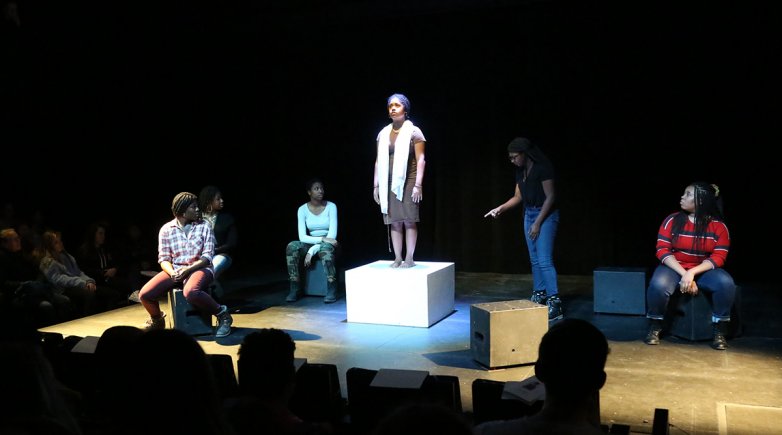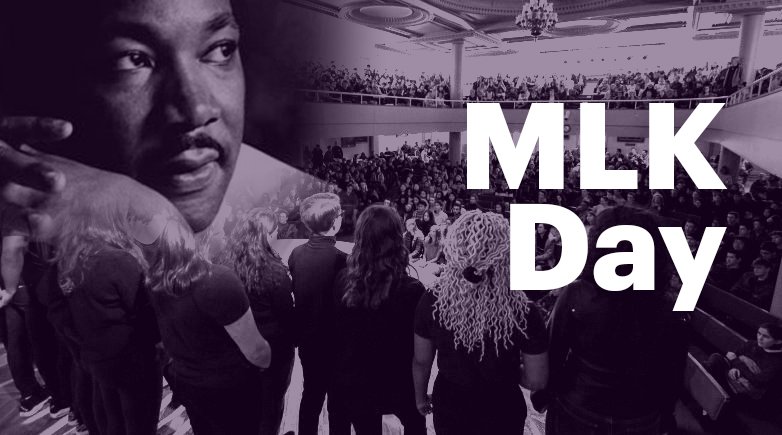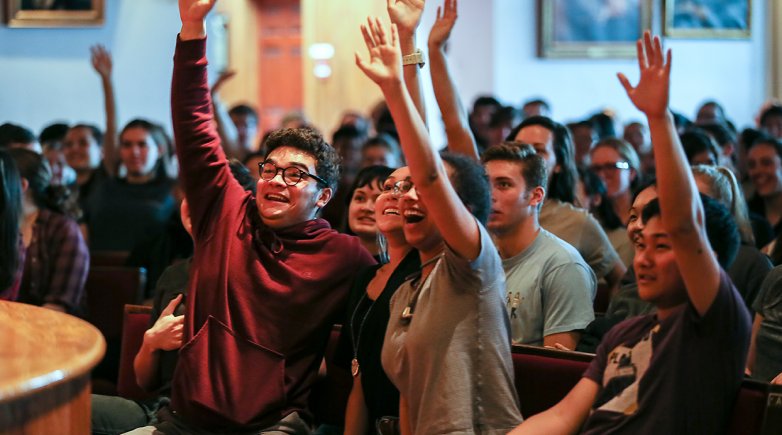Setting the stage for change
As part of Exeter's MLK Day 2019 programming, students performed "Hottentotted," a play written by Charly Simpson '04 and attended workshops led by alums.
There are moments —foundational and prismatic — that inform life’s trajectory. For playwright Charly Simpson ’04, one such moment struck during her upper year at Exeter as she was reading lines for a part in an upcoming play. Midsentence, she understood that she’d never get the role — and it wasn’t a matter of talent. It was simply because of the color of her skin.
“I remember doing the monologue and the instructor not looking at me,” Simpson recalls. “Then realizing, oh, well, it’s ‘The Crucible,’ there’s only one part for me, technically, if this is going to be cast realistically. It’s Tituba, the black woman. There’s no other role for anyone else of color. Why? In an educational setting, why can’t I play whatever role?”
Luckily, it wasn’t a question she wrestled with alone. Simpson went to her instructor, and then her moment became a moment for him, too. “Charly Simpson is a student I will never forget,” says Theater and Dance Department Chair Rob Richards. “I’ll always remember how she made me feel — deeply grateful.” Richards explains: “Years ago, I was directing Arthur Miller’s play ‘The Crucible’ and had what could be described as a literal, or limited, vision, which was to cast the puritanical Salem townsfolk as an all-white community. With daring and thoughtful insight, Charly asked, ‘Mr. Richards, what about reading students of color for the traditionally white parts?’ Here was a powerful teaching moment. Here was a brave young woman of color asking her older white male instructor to consider another perspective. ... I shifted to see the different perspective. ... She made it happen. The student taught the teacher, and I am a better teacher for it, a better man.”
Simpson went on to have that conversation many times, as an undergrad at Brown University, as a master’s student at the University of Oxford, and in her professional career in the theater. But having it first as a teenager was vital. “I’m grateful to have had that initial conversation at Exeter, rather than when I was older,” Simpson says. “It had a profound effect on me,” she adds, saying that it helped her understand the role she could play in creating the next story a student or teacher told. “That conversation had a lot to do with why I’m a writer,” Simpson says. “If I just wrote the plays, with characters like me in them, then there wouldn’t be any excuse to not cast people of color.”
In January, Simpson returned to Exeter for a performance of one of her own plays, "Hottentotted," which she developed and wrote based on interviews she held with friends over the past few years. The play unfolded on the minimalist Actors Lab stage in The David E. and Stacey L. Goel Center with a group of students of color sitting together, learning the history of Sarah Baartman, the Hottentot Venus, a South African woman who was brought to Europe for exhibition during the 19th century, and sharing painful, humorous and ultimately hopeful stories of what it’s like to be a black woman in the United States today.
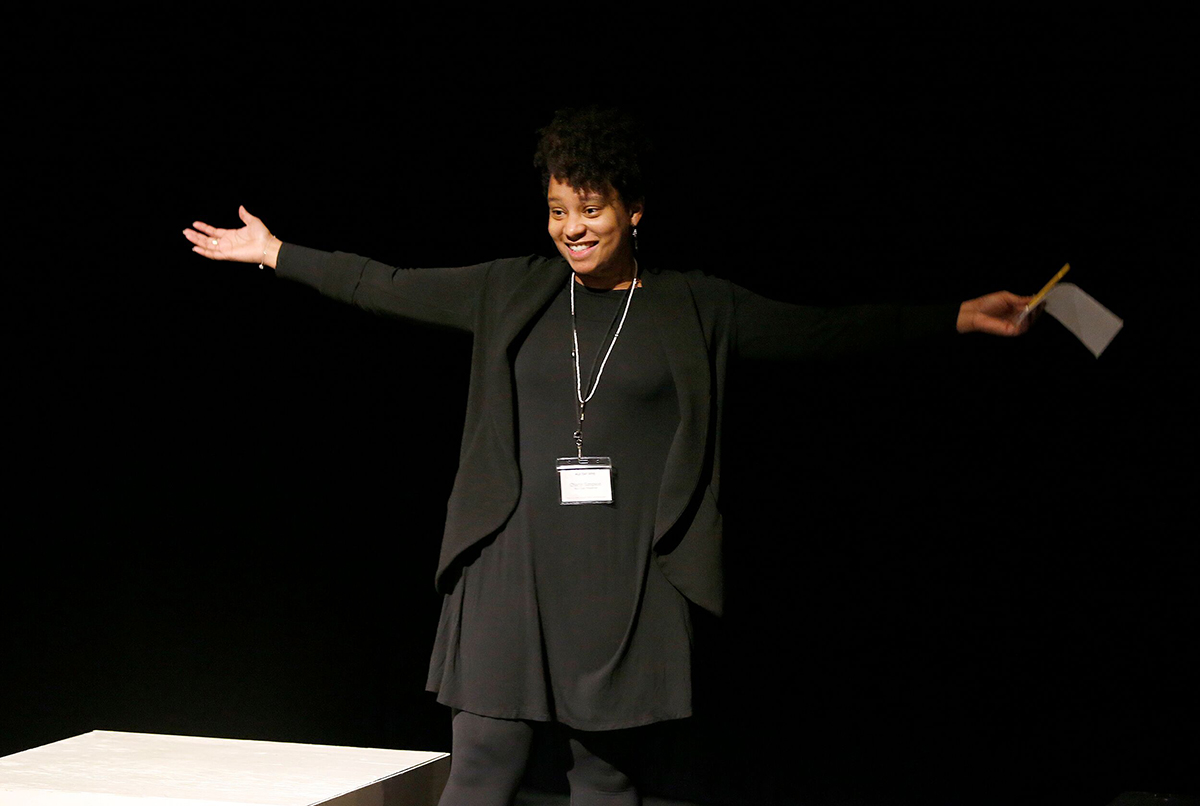
The performance was part of Exeter’s 2019 Dr. Martin Luther King Jr. Day programming. Over two days, students, faculty, staff, alumni and thought provocateurs gathered to honor the legacy of the slain civil rights leader. Through dance and theatrical performances, poetry readings, lectures and interactive workshops, the community explored issues of race, equity and inclusion through the lens of this year’s theme: “Gen Z Activism: Responsibility, Accountability, Intersectionality.” “When [English Instructor] Mercy [Carbonell] reached out about work of mine that would be in line with MLK Day, this one stood out,” Simpson says. “To see how this piece, this idea that I had, has a place and can have an impact far beyond what I imagined, especially on MLK Day — I feel very proud and honored to be part of it.”
Simpson collaborated with Richards in his role as faculty director and with eight students over the course of two terms to produce the play. Simpson stressed to the budding thespians the importance of tapping into feelings that they had experienced that were similar to those of the characters in the play. “This play only works when you connect to it on a personal level,” she says. “We can’t actually just discuss our way out of it. One of the things I’ve learned as a writer and an artist is that you have to commit to a work on an emotional level. I hope that the play offered the students an opportunity to step into that place, too.”
Student director Olivia Ross ’19 certainly stepped in. In the playbill she wrote: “Creating 'Hottentotted' with this group of people these past two terms has been one of the most beautiful experiences of my Exeter career. ... Embracing and coming to terms with the story of Sarah Baartman was a difficult journey for all of us — tears were shared but also laughter. ...We saw ourselves reflected in her history, in her yearning and loneliness. .... Charly’s gorgeous words are a prime example of the power of performance art for healing, catharsis — liberation.”
Stage manager Rose Martin ’19 agrees. “Even though we were acting out a very serious play and talking about our personal lives and what it means to be a black woman, there was an underlying sentiment of happiness and just being alive in our play and in our rehearsals.”
By blending the history of Sarah Baartman with today, Simpson’s play makes the historical relevant. "Hottentotted" makes people aware of history, aware of race-based assumptions, Simpson says. “It is import-ant to know that piece of history so we can prevent it from happening again in whatever form that may take,” she says. “Knowing that empowers us to have a different response or a different way of fighting against those thoughts and beliefs.”
Sharing this work with the next generation of students was a main motivator for Simpson. “The fact that different generations of students feel as though the play connected to them, that was really, really impactful,” she says. “It was nice to go back and have these conversations and see that the school, and also the students, are in a different place and are having these conversations much earlier. And thank God they are.”
Dissecting intersectionality
As an educator, youth worker and doctoral candidate in curriculum studies and teacher development at the University of Toronto, Rachel Rhoades ’04 is devoted to arts-based, nonviolent civic action.
Rhoades returned to campus on MLK Day to inform and inspire Exonians on the ways young people can band together to incite change. In an interactive workshop, Rhoades introduced students to “intersectionality” — a term coined by Kimberlé Crenshaw decades ago to describe the interconnections among different social categorizations such as race, class and gender that lead to oppression or discrimination.
Then she asked attendees to not just talk about issues of social injustice, but embody them. In small breakout groups, students and faculty developed tableaus or short theatrical scenes that depicted their “real,” “ideal,” and “transitional,” visions for a more just future. Each group enacted three vignettes, lasting less than five minutes, on one of three themes: climate change, indigenous rights or antiblack racism. The resulting performances sparked spirited conversations as viewers commented on others’ work and shared personal stories of when they had experienced injustice.
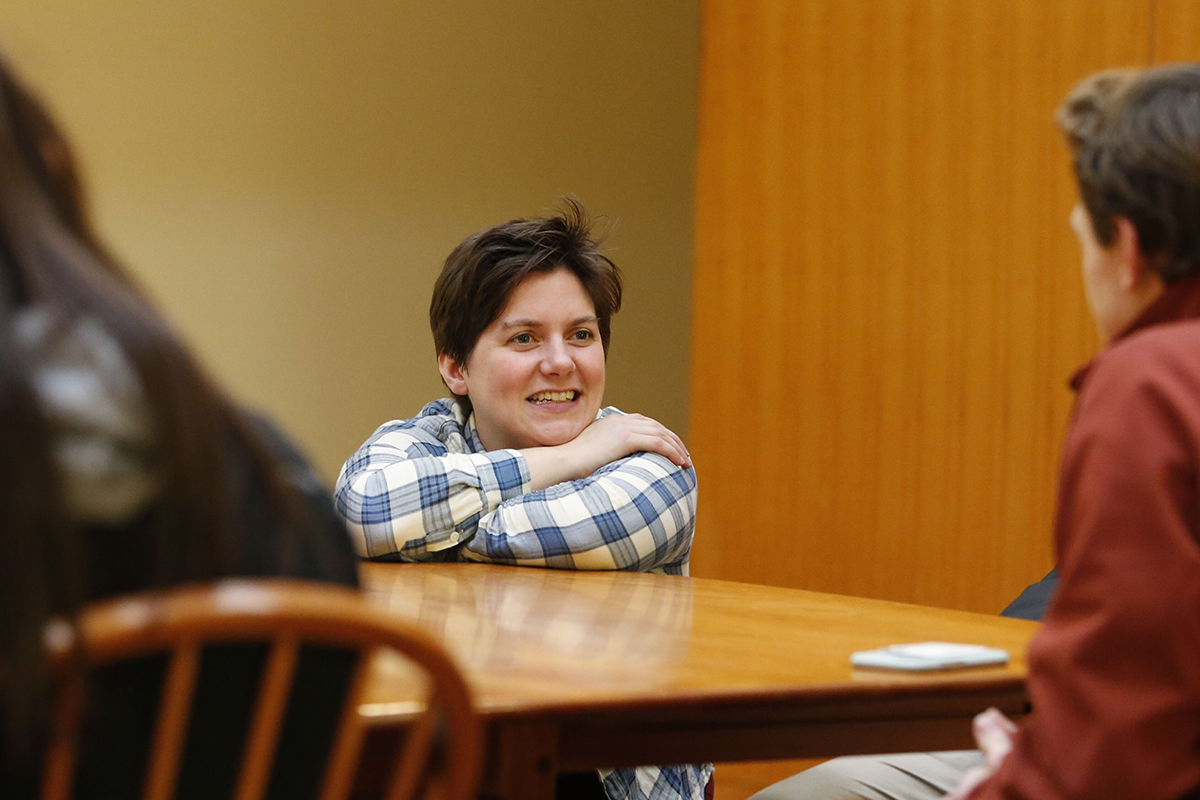
It was an experience that stuck with Ursie Wise ’21. “Of all the activities I went to during the day, this workshop stood out to me the most,” Wise wrote in a reflection piece for her English class. “Growing up, I wasn’t educated on the drastic difference in living conditions on reservations. I was taught about Native American history, but not about the current conditions of reservations. This workshop made me realize not only that I have so much to learn about oppression and racism in this country, but also helped me understand why some young people can find themselves uneducated on racial injustice. To put it simply, it just isn’t being emphasized enough in our childhoods and early educations.”
Rhoades hopes her workshop offered an alternative way for students like Wise to engage in social justice issues and embody empathy. “When you act these ideas and experiences out with your body,” Rhoades says, “it really stays with you.”
A complex conversation
A third alumna joined Charly Simpson and Rachel Rhoades in returning to campus for Exeter’s MLK Day 2019: Julie Chung ’16 led a workshop titled “Asian American Activism: Where Do We Fit?” for dozens of students and faculty in a packed Latin Study.
A junior at Harvard studying social anthropology with a secondary degree in global health and health policy, Chung guided a discussion that touched on themes of identity, privilege and racism within the Asian-American community. Chung set a welcoming tone and prompted students to think about what their ethnicity means to them in terms of identity. Twenty-five percent of Exeter’s student body is Asian or Asian-American.
“The Asian-American identity is so complex, but it is what you make out of it,” Chung said.
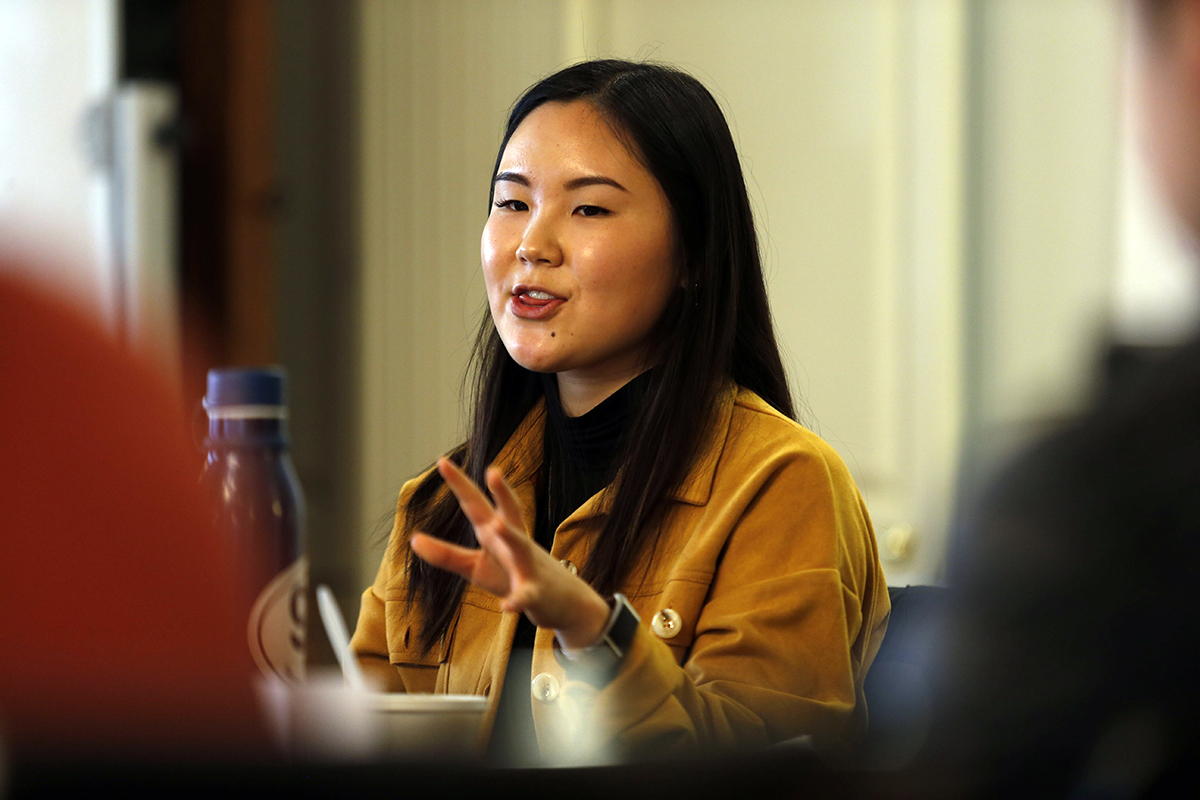
A prevailing topic throughout the discussion was racism, at both a structural and personal level, and what can be done to combat it. Chung acknowledged how uncomfortable it can be to confront racism, especially when it comes from a relative or loved one. Present for the session was Khine Win ’20, who shared her feelings about the challenge of speaking up against racist sentiments.
“I don’t always feel like I’m in the position to correct someone when I haven’t had the same life experiences as they have,” Win said.
Chung ended the session by asking students to pledge a “commitment to change.” Each student wrote a personal statement with various ways they vowed to get involved at a personal, community and political level to promote a positive change in race relations.
Editor's note: This article first appeared in the spring 2019 issue of The Exeter Bulletin.
